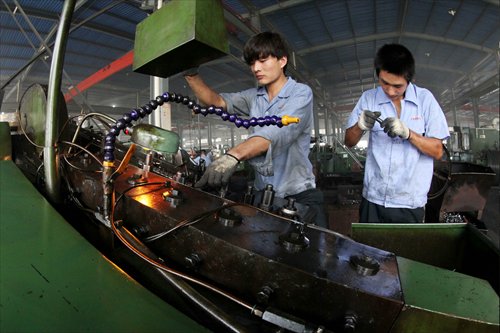Chinese fastener makers urge EU to drop tariffs
Industry needs upgrade to refocus on domestic demand

Workers at a fastener equipment manufacturer in Ganyu county, East China's Jiangsu Province assemble fasteners for export. Photo: IC
An industry group in China said Wednesday it strongly opposes a recent EU decision to renew hefty tariffs on fastener imports from China, calling the EU’s levy wrong and a violation of WTO rules.
China’s steel fastener industry is shocked by the EU’s protectionist practice to re-impose anti-dumping duties on Chinese fastener exporters for another five years, the China Chamber of Commerce for Import and Export of Machinery and Electronic Products (CCCME) said in a statement released at a press conference on Wednesday in Beijing.
The industry hopes the European Commission would fully honor WTO rules, withdraw its practice and resolve the trade dispute through negotiations, the statement read.
In March, the EU re-imposed a tariff of as high as 74.1 percent on steel fasteners from China – widely used for cars, machines and aircraft – for another five year, claiming Chinese fastener manufacturers sell products in the EU below market value, a practice called dumping.
The EU levied the anti-dumping duties ranging from 26.5 percent to 85 percent on Chinese fastener exporters for five years starting January 2009 at the request of EU’s manufacturers.
The decision prompted China to lodge a complaint against the EU to the WTO which found the EU faulty in calculating the anti-dumping duties on Chinese manufacturers in 2010. In 2012, the EU reduced the tariff between 22.9 percent and 74.1 percent.
However, the Chinese fastener industry believes the duties would shut them out of EU markets. In 2013, China requested the WTO to set up a panel to examine whether EU fastener duties comply with the WTO ruling. The panel is due to announce a decision in July.
China’s fastener exports to the EU dropped from 8,000 tons from 600,000 tons between 2006 and 2013, with the market share falling to 0.5 percent from 26 percent, data from the CCCME showed.
The reason that the EU imposes hefty duties on Chinese manufacturers is the prices of Chinese manufacturers are not set based on the market but by the State as it does not recognize China as a market economy, Fu Donghui, senior partner at Allbright Law Offices representing Chinese manufacturers, said at the same conference.
But the fastener industry is one of the first industries in China to be privatized with more than 95 percent of fastener producers being private companies, Fu said.
Developed economies including the US and the EU refuse to recognize China as a market economy when China joined the WTO in 2001. Under a market economy, prices of goods are determined based on supply and demand while prices are set by the central government in a non-market economy.
Labeling China as a non-market economy makes it easier for China’s trading partners to impose punitive anti-dumping duties on Chinese products by using price data from a third country which is significantly lower than in China.
The WTO failed to answer the Global Times’ request for comment as of press time. But the European Commission reiterated in an e-mail sent to the Global Times on Wednesday that the decision was the result of a thorough investigation which concluded that lifting the anti-dumping measures would likely lead to dumping practices which would harm the EU industry.
The group will request the Ministry of Commerce to oppose the EU’s decision through the WTO and if the EU refuses to comply with WTO rulings, the industry will take retaliatory measures which we always prefer not to do, Feng Jinyao, director of China Fastener Industry Association, said at the press conference.
But Feng admitted China’s fastener industry suffers from overcapacity and are still low-end.
The industry needs to produce more high-end products and focus more on the domestic market to capitalize on the opportunities generated by the country’s “Made in China 2025” strategy, which seeks to upgrade the country’s manufacturing industry, Feng told the Global Times on the sidelines of the conference.
“Other options for Chinese manufacturers include turning their competitors into friends by acquiring and merging their EU counterparts or cooperating with EU’s downstream manufacturers,” Tu Xinquan, a WTO expert, told the Global Times Wednesday.